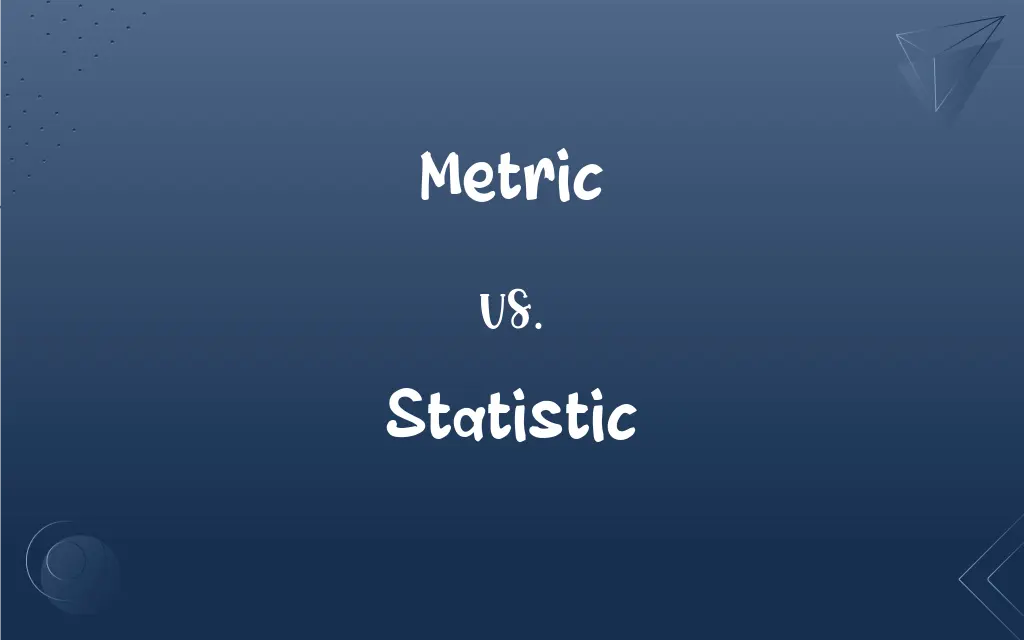Metric vs. Statistic: What's the Difference?
By Harlon Moss & Janet White || Updated on May 20, 2024
Metric is a standard of measurement used to evaluate performance, while a statistic is a numerical value derived from data analysis to summarize or interpret information.

Key Differences
A metric is a quantitative measurement used to track and assess the status of a specific process. For example, businesses often use metrics like sales figures or customer satisfaction scores to gauge performance. A metric is typically predefined and used consistently over time. A statistic, on the other hand, is a value that results from applying a statistical method to data. It summarizes, interprets, or infers information from a data set. For instance, the average score of students in a test is a statistic. Statistics can change based on the data collected and the methods applied.
Metrics are often static and used as benchmarks, while statistics are more dynamic and can vary with each data analysis. Metrics provide specific insights into performance, whereas statistics offer a broader understanding of data patterns and relationships.
In business, a key performance indicator (KPI) is a type of metric that focuses on crucial aspects of performance. Conversely, in research, statistics help in testing hypotheses and making predictions based on data.
Both metrics and statistics play critical roles in decision-making. Metrics help in setting goals and tracking progress, whereas statistics help in understanding trends and making data-driven decisions.
Metrics are usually expressed in a fixed format, such as percentages or counts. Statistics may include a range of formats, including means, medians, variances, and probabilities, depending on the analysis.
ADVERTISEMENT
Comparison Chart
Definition
Standard of measurement
Numerical value from data analysis
Usage
Track and assess performance
Summarize or interpret data
Nature
Static and predefined
Dynamic and variable
Example
Sales figures, customer satisfaction
Mean score, standard deviation
Purpose
Benchmarking, goal setting
Hypothesis testing, data interpretation
ADVERTISEMENT
Metric and Statistic Definitions
Metric
A standard of measurement.
The metric for success in the company is the annual revenue growth.
Statistic
Value summarizing data.
The statistic shows a significant increase in test scores.
Metric
Measurement tool for comparison.
The metric used to compare schools includes graduation rates.
Statistic
Figure representing data characteristics.
The variance statistic indicates the spread of data points.
Metric
Specific parameter to gauge performance.
Customer satisfaction is a key metric in service industries.
Statistic
Data point derived from a sample.
The median income statistic helps understand economic trends.
Metric
Quantitative measure for assessment.
Employee performance is evaluated using various metrics.
Statistic
Numerical summary of information.
The statistic revealed that 40% of users prefer the new feature.
Metric
Of or relating to the metric system of measurement.
Statistic
A numerical value from data analysis.
The average age of participants is a key statistic in the study.
Metric
(music) Of or relating to the meter of a piece of music.
Statistic
A numerical piece of information.
Metric
Of or relating to distance.
Statistic
A calculated numerical value (such as the sample mean) that characterizes some aspect of a sample set of data, and that is often meant to estimate the true value of a corresponding parameter (such as the population mean) in an underlying population.
Metric
A measure for something; a means of deriving a quantitative measurement or approximation for otherwise qualitative phenomena (especially used in engineering).
What metric should be used for performance evaluation?
What are the most important metrics to track for your business?
It's the most important single metric that quantifies the predictive performance.
How to measure marketing? Use these key metrics for measuring marketing effectiveness.
There is a lack of standard metrics.
Statistic
One viewed solely as a piece of statistical or numerical information
Got laid off and became another statistic in the slumping economy.
Metric
(mathematics) A function for the measurement of the "distance" between two points in some metric space: it is a real-valued function d(x,y) between points x and y satisfying the following properties: (1) "non-negativity": , (2) "identity of indiscernibles": , (3) "symmetry": , and (4) "triangle inequality": .
Statistic
Alternative form of statistical
Metric
(mathematics) A metric tensor.
Statistic
A single item in a statistical study.
Metric
Abbreviation of metric system
Statistic
A quantity calculated from the data in a sample, which characterises an important aspect in the sample (such as mean or standard deviation).
Metric
To measure or analyse statistical data concerning the quality or effectiveness of a process.
We need to metric the status of software documentation.
We need to metric the verification of requirements.
We need to metric the system failures.
The project manager is metricking the closure of the action items.
Customer satisfaction was metricked by the marketing department.
Statistic
A person, or personal event, reduced to being an item of statistical information.
By dying from an overdose, he became just another statistic.
Metric
Relating to measurement; involving, or proceeding by, measurement.
Statistic
Of or pertaining to statistics; as, statistical knowledge; statistical tabulation.
Metric
Of or pertaining to the meter as a standard of measurement; of or pertaining to the decimal system of measurement of which a meter is the unit; as, the metric system; a metric measurement.
Statistic
A datum that can be represented numerically
Metric
A function of a topological space that gives, for any two points in the space, a value equal to the distance between them
Metric
A decimal unit of measurement of the metric system (based on meters and kilograms and seconds);
Convert all the measurements to metric units
It is easier to work in metric
Metric
A system of related measures that facilitates the quantification of some particular characteristic
Metric
Based on the meter as a standard of measurement;
The metric system
Metrical equivalents
Metric
The rhythmic arrangement of syllables
Metric
Benchmark for tracking progress.
Monthly sales targets serve as a crucial metric for the team.
FAQs
How is a statistic different from a metric?
A statistic is a numerical value from data analysis, while a metric is a predefined measure for assessment.
What is an example of a metric in business?
Sales revenue is a common business metric.
What is an example of a statistic in research?
The mean score of test results is a typical statistic in research.
Can metrics change over time?
Metrics themselves are static, but their values can change as performance varies.
What is a dynamic statistic?
A dynamic statistic changes with each new data analysis, reflecting current data trends.
What is a metric?
A metric is a quantitative measure used to evaluate and track performance.
Can a statistic be a metric?
Yes, when a statistic is used consistently to measure performance, it can function as a metric.
Why are metrics important?
Metrics help organizations track progress and set performance benchmarks.
Can statistics be used for predictions?
Yes, statistics can help in making predictions based on data analysis.
What is data analysis?
Data analysis involves inspecting and modeling data to extract useful information.
What is a performance benchmark?
A performance benchmark is a standard measure used to compare performance over time.
How do metrics help in goal setting?
Metrics provide specific targets and measures to achieve strategic objectives.
Why are statistics important?
Statistics provide insights into data patterns and support decision-making.
Are all metrics numerical?
Most metrics are numerical, though some may use categories or rankings.
What is data interpretation?
Data interpretation involves making sense of numerical data to understand trends and patterns.
How do statistics help in research?
Statistics help researchers understand data, test theories, and validate results.
What is a KPI?
A Key Performance Indicator (KPI) is a type of metric focusing on essential performance areas.
How do businesses use metrics?
Businesses use metrics to monitor performance and achieve strategic goals.
How do researchers use statistics?
Researchers use statistics to analyze data, test hypotheses, and draw conclusions.
Can metrics be qualitative?
Metrics are typically quantitative, but qualitative aspects can be quantified into metrics.
About Author
Written by
Harlon MossHarlon is a seasoned quality moderator and accomplished content writer for Difference Wiki. An alumnus of the prestigious University of California, he earned his degree in Computer Science. Leveraging his academic background, Harlon brings a meticulous and informed perspective to his work, ensuring content accuracy and excellence.
Co-written by
Janet WhiteJanet White has been an esteemed writer and blogger for Difference Wiki. Holding a Master's degree in Science and Medical Journalism from the prestigious Boston University, she has consistently demonstrated her expertise and passion for her field. When she's not immersed in her work, Janet relishes her time exercising, delving into a good book, and cherishing moments with friends and family.































































